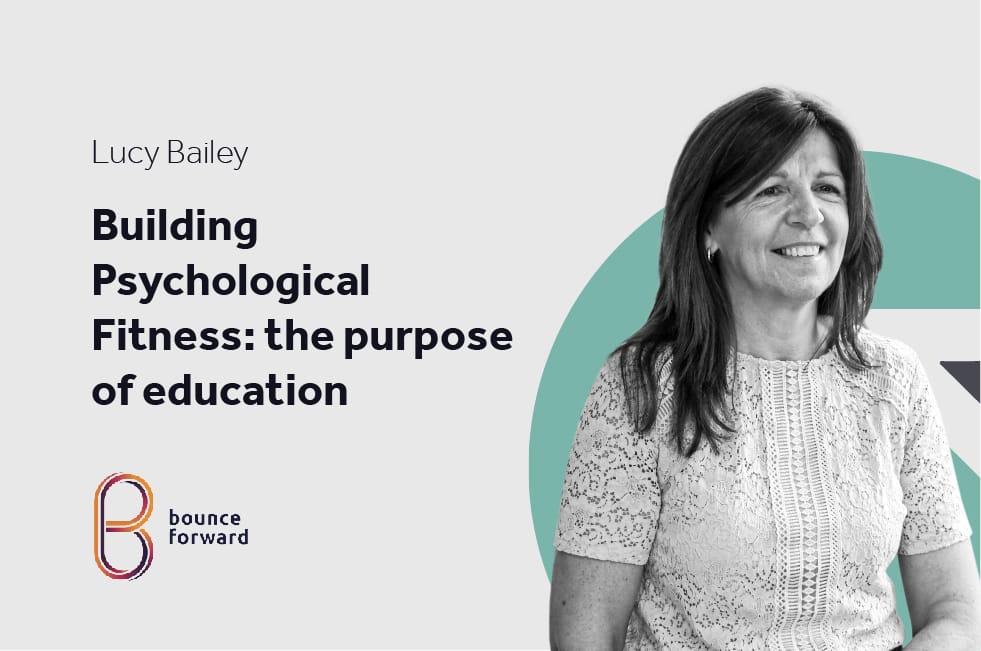As we move into the second year of our work at the Foundation for Education Development (FED) and following the launch of the FED National Education Consultation Report, we hosted a series of roundtable discussions seeking to answer the theme ‘Whatever happened to…?’. This roundtable discussion focussed on ‘Whatever happened to…wellbeing?’
We asked Lucy Bailey, Chief Executive Officer and Founder of Bounce Forward, to share her input into the roundtable discussion. Over the last twelve years Lucy has focused on education and has been instrumental in embedding resilience curricular in schools and services across the UK. Lucy tells us that at present ‘education is not geared towards equipping children with the skills and tools they need to live happy, healthy lives.’
Building Psychological Fitness: the purpose of education
Imagine this world: all children, are taught the basic principles of brain training for mental health.
What if a preventative method existed that would radically increase the chances of lifelong psychological fitness? What if it didn’t even cost that much, set against the vast costs of after care for the current epidemic of emotional disturbances during adolescence (and then beyond)?
The Mental Health of Children and Young People (MHCYP) survey[1] found that one in six children aged 5-16 had a probable mental health disorder in 2020. Earlier data showed that only a quarter of children had contact with a mental health specialist, and one quarter had no support at all.
Bounce Forward is a thirteen-year-old charity, deeply expert and profoundly ambitious having built impeccable foundations, based on sound scientific research from neuroscience and psychology.
Bounce Forward trains schoolteachers to teach the fundamental principles of psychological fitness, using Healthy Minds, starting at the age of 9+ – because that’s the age when children are first able to think about their own thinking, and when the plasticity of the brain is high, so learning new habits is optimal. Starting ahead of the turbulent years of adolescence is a key factor in reducing mental health problems as we know 50% of them start before the age of 14. Psychological fitness, taught young, effectively inoculates young children against common mental health problems.
“If we wish to predict which children will lead satisfying adult lives, the best indicator is their emotional health at age 16. This is more important than their academic qualifications right up to the age of 25 – and more important than their behaviour in childhood.” (Schools Policy Appraisal Handbook June 2021 Department of Education)
Healthy Minds starts with training teachers. Brain science emphasises the importance of adult role models, in establishing healthy habits of thoughts, feelings and behaviours. Teachers learn first, so they increase their psychological fitness, able to role model these skills to pupils on a daily basis. Each teacher receives 62 lessons, all ready to use in the classroom, that engage students in topics that are relevant to their age, development and the world around them.
Healthy Minds makes it possible for children to be psychologically fit at the age of sixteen, and, therefore, as adults.

This graph shows the % gain for the average pupil as a result of the four-year teaching Healthy Minds when compared with other pupils nationwide.
Healthy Minds Curriculum

Unbelievable!
• It costs just £6.20 per child to implement Healthy Minds
• That’s just £1.24 per child, per year
• The long-term life savings are incalculable
As it currently stands, education is not geared towards equipping children with the skills and tools they need to live happy, healthy lives. This is, in part because there are no exams at the end, and so it lacks the priority of exam subjects.
At Bounce Forward, we are seeking a fundamental shift in an understanding of the role schools can play in the long-term health and wellbeing of our future generations. Healthy Minds is part of that vision.
To find out more [email protected] or call 0330 133 0776
[1] The survey can be found at: https://files.digital.nhs.uk/AF/AECD6B/mhcyp_2020_rep_v2.pdf



